 Buy/Find out more
Buy/Find out more

Clifford J. Rosen

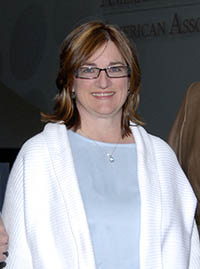 Karen M. Lyons is a Professor in the Departments of Orthopaedic Surgery and Molecular, Cell & Developmental Biology at the University of California, Los Angeles. Her research focuses on the roles of BMP signaling pathways in cartilage development and disease, using knockout and transgenic mouse models. She also studies the functions of members of the matricellular CCN family. Prior to her appointment at UCLA, Dr. Lyons performed postdoctoral studies with Brigid Hogan, where she cloned several novel members of the BMP family, and with Vicki Rosen at Genetics Institute, where she worked on the functions of BMP receptors, which had just been discovered at that time. In addition, Dr. Lyons has served as a standing member of several NIH study sections for NIAMS, Chair of the Grant Review Panel for the Scleroderma Foundation, and Co-chair for the Cartilage Biology and Pathology Gordon Research Conference.
Karen M. Lyons is a Professor in the Departments of Orthopaedic Surgery and Molecular, Cell & Developmental Biology at the University of California, Los Angeles. Her research focuses on the roles of BMP signaling pathways in cartilage development and disease, using knockout and transgenic mouse models. She also studies the functions of members of the matricellular CCN family. Prior to her appointment at UCLA, Dr. Lyons performed postdoctoral studies with Brigid Hogan, where she cloned several novel members of the BMP family, and with Vicki Rosen at Genetics Institute, where she worked on the functions of BMP receptors, which had just been discovered at that time. In addition, Dr. Lyons has served as a standing member of several NIH study sections for NIAMS, Chair of the Grant Review Panel for the Scleroderma Foundation, and Co-chair for the Cartilage Biology and Pathology Gordon Research Conference.
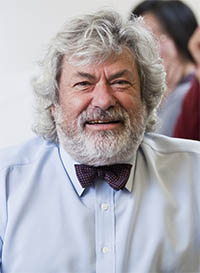 Professor Ego Seeman has worked in the field of osteoporosis in ageing for 30 years, studying the epidemiology, pathogenesis, risk factors and treatment of fractures in advanced age in women and men of Caucasian and Asian origin. He helped establish the Geelong Osteoporosis Study, a population based study running for over 20 years giving insights of worldwide significance into the morbidity, mortality, and health costs of osteoporosis. His work has emphasized the neglected and pivotal role of cortical bone deterioration in development of osteoporosis in old age as a major cause of bone fractures in old age. He has contributed as collaborator in many studies of drug therapy used today for prevention of fractures in the elderly (alendronate, denosumab, risedronate, strontium ranelate). Professor Seeman has been the recipient of numerous awards and honors including the American Society of Bone and Mineral Research’s Fred C. Bartter Award in 2002 and the IBMS J Haddad Jr Award in 2013. He has also served is a past President of the Australian and New Zealand Bone Mineral Society. Professor Seeman’s research has been widely published and he has served in editorial capacities for Progress in Osteoporosis and Osteoporosis International.
Professor Ego Seeman has worked in the field of osteoporosis in ageing for 30 years, studying the epidemiology, pathogenesis, risk factors and treatment of fractures in advanced age in women and men of Caucasian and Asian origin. He helped establish the Geelong Osteoporosis Study, a population based study running for over 20 years giving insights of worldwide significance into the morbidity, mortality, and health costs of osteoporosis. His work has emphasized the neglected and pivotal role of cortical bone deterioration in development of osteoporosis in old age as a major cause of bone fractures in old age. He has contributed as collaborator in many studies of drug therapy used today for prevention of fractures in the elderly (alendronate, denosumab, risedronate, strontium ranelate). Professor Seeman has been the recipient of numerous awards and honors including the American Society of Bone and Mineral Research’s Fred C. Bartter Award in 2002 and the IBMS J Haddad Jr Award in 2013. He has also served is a past President of the Australian and New Zealand Bone Mineral Society. Professor Seeman’s research has been widely published and he has served in editorial capacities for Progress in Osteoporosis and Osteoporosis International.
 Paul D. Miller is a Distinguished Clinical Professor of Medicine at the University of Colorado and is also the Medical Director of the Colorado Center for Bone Research, Colorado. Dr. Miller was the Founding President of The International Society for Clinical Densitometry, and Emeritus- in-Chief of The Journal of Clinical Densitometry. He has served on the Board of Directors of The International Osteoporosis Foundation (IOF), and currently is on the Committee of Scientific Advisors of the IOF, and, the National Bone Health Alliance Steering committee to Enhance Research, Surveillance & Evaluation. He has received many awards including most recently an Honorary Doctorate of Science from Gettysburg College, The Distinguished Clinical Professor by The Department of Medicine of the University of Colorado Medical School; and most recently The Distinguished Alumni Award from The George Washington University. Dr. Miller has published widely and is on numerous editorial boards which include Osteoporosis International and Calcified Tissue International, and is a member of the publications committee of The American Society of Bone and Mineral Research.
Paul D. Miller is a Distinguished Clinical Professor of Medicine at the University of Colorado and is also the Medical Director of the Colorado Center for Bone Research, Colorado. Dr. Miller was the Founding President of The International Society for Clinical Densitometry, and Emeritus- in-Chief of The Journal of Clinical Densitometry. He has served on the Board of Directors of The International Osteoporosis Foundation (IOF), and currently is on the Committee of Scientific Advisors of the IOF, and, the National Bone Health Alliance Steering committee to Enhance Research, Surveillance & Evaluation. He has received many awards including most recently an Honorary Doctorate of Science from Gettysburg College, The Distinguished Clinical Professor by The Department of Medicine of the University of Colorado Medical School; and most recently The Distinguished Alumni Award from The George Washington University. Dr. Miller has published widely and is on numerous editorial boards which include Osteoporosis International and Calcified Tissue International, and is a member of the publications committee of The American Society of Bone and Mineral Research.
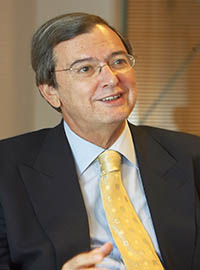 Socrates Papapoulos received his medical degree from the University of Athens, Greece and he was trained in Internal Medicine and Endocrinology in Athens and London, UK. In 1984 he joined the Department of Endocrinology and Metabolic Diseases of the Leiden University Medical Center, the Netherlands where he is currently Professor of Medicine and advisor of the Center of Bone Quality. Since 1974 he has been continuously engaged in basic and clinical research and care of patients with disorders of calcium and bone metabolism. A major objective of his research and clinical activities has been the optimal use of bisphosphonates and the development of novel treatments for osteoporosis.
Socrates Papapoulos received his medical degree from the University of Athens, Greece and he was trained in Internal Medicine and Endocrinology in Athens and London, UK. In 1984 he joined the Department of Endocrinology and Metabolic Diseases of the Leiden University Medical Center, the Netherlands where he is currently Professor of Medicine and advisor of the Center of Bone Quality. Since 1974 he has been continuously engaged in basic and clinical research and care of patients with disorders of calcium and bone metabolism. A major objective of his research and clinical activities has been the optimal use of bisphosphonates and the development of novel treatments for osteoporosis.
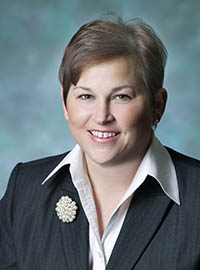 Suzanne M. Jan de Beur is Associate Professor of Medicine at the Johns Hopkins University School of Medicine, Director of the Division of Endocrinology at Johns Hopkins Bayview Medical Center and Associate Director of the Clinical Research Units of the Johns Hopkins Institute for Clinical and Translation Research (CTSA). A graduate of Cornell University and Cornell University Medical College, she completed her Osler Medical Residency and Endocrinology and Metabolism Fellowship at Johns Hopkins Hospital. As a Physician-Scientist and a practicing Endocrinologist, her clinical and research work focus on understanding metabolic bone diseases at the basic level and translating these observations to the bedside. Specifically, her research interests include understanding the physiology of FGF23 and the molecular basis of disorders of phosphate homeostasis, the genetic basis of parathyroid hormone resistance syndromes and the effect of osteoporosis therapies on mesenchymal stem cells. Dr. Jan de Beur has been a member of the American Society for Bone and Mineral Research since 1996, she has served as the Chair of the Membership Development Committee, is currently the Chair of the Professional Practice Committee and was the Co-Chair of the 2011 ASBMR Annual Meeting. She has served as Associate Editor for the Primer on Metabolic Bone Disease and Disorders of Mineral Metabolism for the 6th, 7th and 8th editions.
Suzanne M. Jan de Beur is Associate Professor of Medicine at the Johns Hopkins University School of Medicine, Director of the Division of Endocrinology at Johns Hopkins Bayview Medical Center and Associate Director of the Clinical Research Units of the Johns Hopkins Institute for Clinical and Translation Research (CTSA). A graduate of Cornell University and Cornell University Medical College, she completed her Osler Medical Residency and Endocrinology and Metabolism Fellowship at Johns Hopkins Hospital. As a Physician-Scientist and a practicing Endocrinologist, her clinical and research work focus on understanding metabolic bone diseases at the basic level and translating these observations to the bedside. Specifically, her research interests include understanding the physiology of FGF23 and the molecular basis of disorders of phosphate homeostasis, the genetic basis of parathyroid hormone resistance syndromes and the effect of osteoporosis therapies on mesenchymal stem cells. Dr. Jan de Beur has been a member of the American Society for Bone and Mineral Research since 1996, she has served as the Chair of the Membership Development Committee, is currently the Chair of the Professional Practice Committee and was the Co-Chair of the 2011 ASBMR Annual Meeting. She has served as Associate Editor for the Primer on Metabolic Bone Disease and Disorders of Mineral Metabolism for the 6th, 7th and 8th editions.
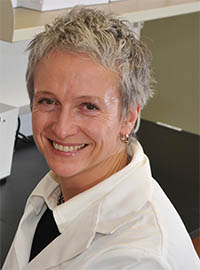 Theresa A. Guise is the Jerry and Peggy Throgmartin Professor of Oncology, Medicine and Pharmacology at the Indiana School of Medicine where she directs a basic and translational research program on the effects of cancer and cancer treatment on muscle and bone. Dr. Guise’s laboratory interests encompass skeletal complications of malignancy: tumor metastasis to bone and the effect of cancer treatment on skeletal health. Specifically, she studies the molecular mechanisms by which tumor cells interact with bone cells to cause either bone destruction (osteolytic metastases) or new bone formation (osteoblastic metastases) as well as muscle weakness using mouse models. The effect of cancer treatments, such as aromatase inhibitors for breast cancer, on bone mass as well as the development and progression of bone metastasis is under investigation. The role of TGF-β in these processes has been a focus of her research for over 15 years. In these areas, she is currently funded by the NIH, the Department of Defense, Susan G. Komen Foundation and other agencies. Dr. Guise’s clinical interests encompass diseases of calcium and bone metabolism in the setting of cancer.
Theresa A. Guise is the Jerry and Peggy Throgmartin Professor of Oncology, Medicine and Pharmacology at the Indiana School of Medicine where she directs a basic and translational research program on the effects of cancer and cancer treatment on muscle and bone. Dr. Guise’s laboratory interests encompass skeletal complications of malignancy: tumor metastasis to bone and the effect of cancer treatment on skeletal health. Specifically, she studies the molecular mechanisms by which tumor cells interact with bone cells to cause either bone destruction (osteolytic metastases) or new bone formation (osteoblastic metastases) as well as muscle weakness using mouse models. The effect of cancer treatments, such as aromatase inhibitors for breast cancer, on bone mass as well as the development and progression of bone metastasis is under investigation. The role of TGF-β in these processes has been a focus of her research for over 15 years. In these areas, she is currently funded by the NIH, the Department of Defense, Susan G. Komen Foundation and other agencies. Dr. Guise’s clinical interests encompass diseases of calcium and bone metabolism in the setting of cancer.
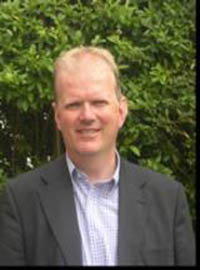 Dr. Richard Keen is a Consultant Rheumatologist at the Royal National Orthopaedic Hospital, Stanmore, UK. He also holds an Honorary Senior Lecturer appointment in Metabolic Bone Diseases at the Institute of Orthopaedics and Musculoskeletal Sciences, University College London, London, UK. Dr. Keen trained in London and developed his interest in bone disease whilst working at St.Thomas’ Hospital under the supervision of Professor Tim Spector. His research into the genetic epidemiology of postmenopausal osteoporosis led to the award of his PhD. This also led to Young Investigator Awards from the American Society of Bone and Mineral Research and the European Calcified Tissue Society. Dr. Keen now heads a clinical research team looking at novel treatments for osteoporosis and other rarer metabolic bone diseases. He is a member of the UK National Osteoporosis Scientific Grants Committee and a member of the UK's National Health Service Clinical Reference Group for Specialised Rheumatology services, including metabolic bone diseases. He is also involved with international initiatives to improve the diagnosis and medical care of patients with these bone diseases.
Dr. Richard Keen is a Consultant Rheumatologist at the Royal National Orthopaedic Hospital, Stanmore, UK. He also holds an Honorary Senior Lecturer appointment in Metabolic Bone Diseases at the Institute of Orthopaedics and Musculoskeletal Sciences, University College London, London, UK. Dr. Keen trained in London and developed his interest in bone disease whilst working at St.Thomas’ Hospital under the supervision of Professor Tim Spector. His research into the genetic epidemiology of postmenopausal osteoporosis led to the award of his PhD. This also led to Young Investigator Awards from the American Society of Bone and Mineral Research and the European Calcified Tissue Society. Dr. Keen now heads a clinical research team looking at novel treatments for osteoporosis and other rarer metabolic bone diseases. He is a member of the UK National Osteoporosis Scientific Grants Committee and a member of the UK's National Health Service Clinical Reference Group for Specialised Rheumatology services, including metabolic bone diseases. He is also involved with international initiatives to improve the diagnosis and medical care of patients with these bone diseases.
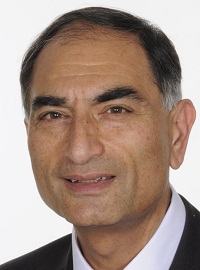 Rajesh Thakker is the May Professor of Medicine at the University of Oxford, UK. His main research interests include the molecular basis of disorders of calcium homeostasis, and his work is funded by the MRC (UK), Wellcome Trust, National Kidney Research UK, and EU Famework 6 (FP6) and FP7 programmes. He has been the recipient of many prizes which include Young Investigator Award from the ASBMR (USA), the Raymond-Horton Smith Prize (Cambridge University, UK), the Society for Endocrinology (UK) medal, the European Journal of Endocrinology Prize (EFES), the Graham Bull Prize from the Royal College of Physicians (UK), the Parathyroid Medal from the Fondazione Raffaella Becagli (F.I.R.M.O.), the Jack W. Coburn Endowed Lectureship from the American Society of Nephrology (USA), and the Louis V Avioli Founder’s Award from the ASBMR (USA). He was co-chair for organising the 2008 ASBMR meeting (Montreal, Canada).
Rajesh Thakker is the May Professor of Medicine at the University of Oxford, UK. His main research interests include the molecular basis of disorders of calcium homeostasis, and his work is funded by the MRC (UK), Wellcome Trust, National Kidney Research UK, and EU Famework 6 (FP6) and FP7 programmes. He has been the recipient of many prizes which include Young Investigator Award from the ASBMR (USA), the Raymond-Horton Smith Prize (Cambridge University, UK), the Society for Endocrinology (UK) medal, the European Journal of Endocrinology Prize (EFES), the Graham Bull Prize from the Royal College of Physicians (UK), the Parathyroid Medal from the Fondazione Raffaella Becagli (F.I.R.M.O.), the Jack W. Coburn Endowed Lectureship from the American Society of Nephrology (USA), and the Louis V Avioli Founder’s Award from the ASBMR (USA). He was co-chair for organising the 2008 ASBMR meeting (Montreal, Canada).
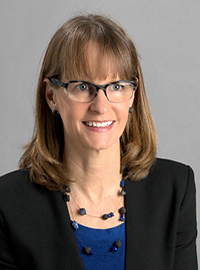 Laurie K. McCauley is the William K. and Mary Anne Najjar Professor of Dentistry, Department of Periodontics and Oral Medicine and Professor in the Department of Pathology at the Medical School. Dr. McCauley earned her B.S., D.D.S., M.S. and Ph.D. (veterinary pathobiology) all from The Ohio State University. She has had several visiting scientist/professor appointments including the Institut de Genetique et de Biologie Moleculaire et Cellulaire, the École Normale Supérieure de Lyon, and the Center for Experimental Therapeutics and Reperfusion Injury, Brigham and Women’s Hospital, Harvard Medical School. McCauley is a fellow in the American Association for the Advancement of Science, a former council member of the American Society of Bone and Mineral Research, former Associate Editor of the Journal of Bone and Mineral Research and also served on the National Institutes of Health, National Advisory Dental & Craniofacial Research Council. For more than twenty years, Dr. McCauley has led an active research program in hormonal controls of bone remodeling, parathyroid hormone anabolic actions in bone, and prostate cancer skeletal metastasis. Among the many recognitions of her research are the inaugural Paula Stern Achievement award from ASBMR in 2010 and a distinguished scientist award from the International Association for Dental Research in 2011.
Laurie K. McCauley is the William K. and Mary Anne Najjar Professor of Dentistry, Department of Periodontics and Oral Medicine and Professor in the Department of Pathology at the Medical School. Dr. McCauley earned her B.S., D.D.S., M.S. and Ph.D. (veterinary pathobiology) all from The Ohio State University. She has had several visiting scientist/professor appointments including the Institut de Genetique et de Biologie Moleculaire et Cellulaire, the École Normale Supérieure de Lyon, and the Center for Experimental Therapeutics and Reperfusion Injury, Brigham and Women’s Hospital, Harvard Medical School. McCauley is a fellow in the American Association for the Advancement of Science, a former council member of the American Society of Bone and Mineral Research, former Associate Editor of the Journal of Bone and Mineral Research and also served on the National Institutes of Health, National Advisory Dental & Craniofacial Research Council. For more than twenty years, Dr. McCauley has led an active research program in hormonal controls of bone remodeling, parathyroid hormone anabolic actions in bone, and prostate cancer skeletal metastasis. Among the many recognitions of her research are the inaugural Paula Stern Achievement award from ASBMR in 2010 and a distinguished scientist award from the International Association for Dental Research in 2011.
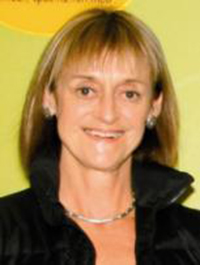 Juliet Compston is Emeritus Professor of Bone Medicine at the University of Cambridge School of Clinical Medicine. Her research is focused on the pathophysiology of osteoporosis and the cellular and structural mechanisms by which pharmacological interventions preserve bone mass and reduce fracture risk. She has conducted studies into the pathophysiology of bone disease in a number of disorders, including postmenopausal osteoporosis, post-transplantation osteoporosis and cystic fibrosis. Recently her research has focused on fractures in obese postmenopausal women. Professor Compston is Editor-in-Chief of the Journal of Bone and Mineral Research. She is a past President of the Bone and Tooth Society of Great Britain, as well as a past Chairman and President of the International Society of Bone Morphometry. She takes up the post of Editor-in-Chief of the Journal of Bone and Mineral Research in January 2013. She is Chair of the European Union Osteoporosis Consultation Panel and of the UK National Osteoporosis Guidelines Group. She has published over 350 original research papers and reviews. In 2006, Professor Compston was awarded the National Osteoporosis Society Kohn Foundation Award, and in 2009, the International Bone and Mineral Society John G Haddad Jr Award and the ASBMR Frederic C Bartter Award.
Juliet Compston is Emeritus Professor of Bone Medicine at the University of Cambridge School of Clinical Medicine. Her research is focused on the pathophysiology of osteoporosis and the cellular and structural mechanisms by which pharmacological interventions preserve bone mass and reduce fracture risk. She has conducted studies into the pathophysiology of bone disease in a number of disorders, including postmenopausal osteoporosis, post-transplantation osteoporosis and cystic fibrosis. Recently her research has focused on fractures in obese postmenopausal women. Professor Compston is Editor-in-Chief of the Journal of Bone and Mineral Research. She is a past President of the Bone and Tooth Society of Great Britain, as well as a past Chairman and President of the International Society of Bone Morphometry. She takes up the post of Editor-in-Chief of the Journal of Bone and Mineral Research in January 2013. She is Chair of the European Union Osteoporosis Consultation Panel and of the UK National Osteoporosis Guidelines Group. She has published over 350 original research papers and reviews. In 2006, Professor Compston was awarded the National Osteoporosis Society Kohn Foundation Award, and in 2009, the International Bone and Mineral Society John G Haddad Jr Award and the ASBMR Frederic C Bartter Award.
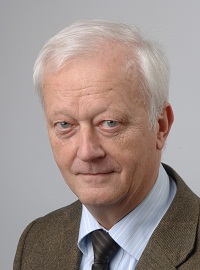 Roger Bouillon is professor (emeritus since 2010) in endocrinology (internal medicine) at the University and University Hospital of the Catholic University of Leuven (K.U.Leuven) in Belgium. He is a member of the Royal Academy of Medicine (Belgium) and a Fellow of the Royal College of Physicians (London). He was a founding member and later President of the European Board of Endocrinology (UEMS 1988-2002). He is a member of several European Science Foundation Committees (Board member of the European Medical Research Council) and of the European Space Agency Life Science working group. He is the immediate past-president of the International Bone and Mineral Society (2011-13) and is co-organizer of the vitamin D workshop. He was vice president for research of the University of Leuven from 1995-2005. He is coauthor of more than 500 peer reviewed articles that generated about 20,000 ISI citations and a H index of 82. The main topics of his research deal with various aspects of bone and calcium homeostasis and this spans the spectrum of basic, translational and clinical research. Vitamin D is a major research focus throughout his scientific career.
Roger Bouillon is professor (emeritus since 2010) in endocrinology (internal medicine) at the University and University Hospital of the Catholic University of Leuven (K.U.Leuven) in Belgium. He is a member of the Royal Academy of Medicine (Belgium) and a Fellow of the Royal College of Physicians (London). He was a founding member and later President of the European Board of Endocrinology (UEMS 1988-2002). He is a member of several European Science Foundation Committees (Board member of the European Medical Research Council) and of the European Space Agency Life Science working group. He is the immediate past-president of the International Bone and Mineral Society (2011-13) and is co-organizer of the vitamin D workshop. He was vice president for research of the University of Leuven from 1995-2005. He is coauthor of more than 500 peer reviewed articles that generated about 20,000 ISI citations and a H index of 82. The main topics of his research deal with various aspects of bone and calcium homeostasis and this spans the spectrum of basic, translational and clinical research. Vitamin D is a major research focus throughout his scientific career.